|
|
montreal's
 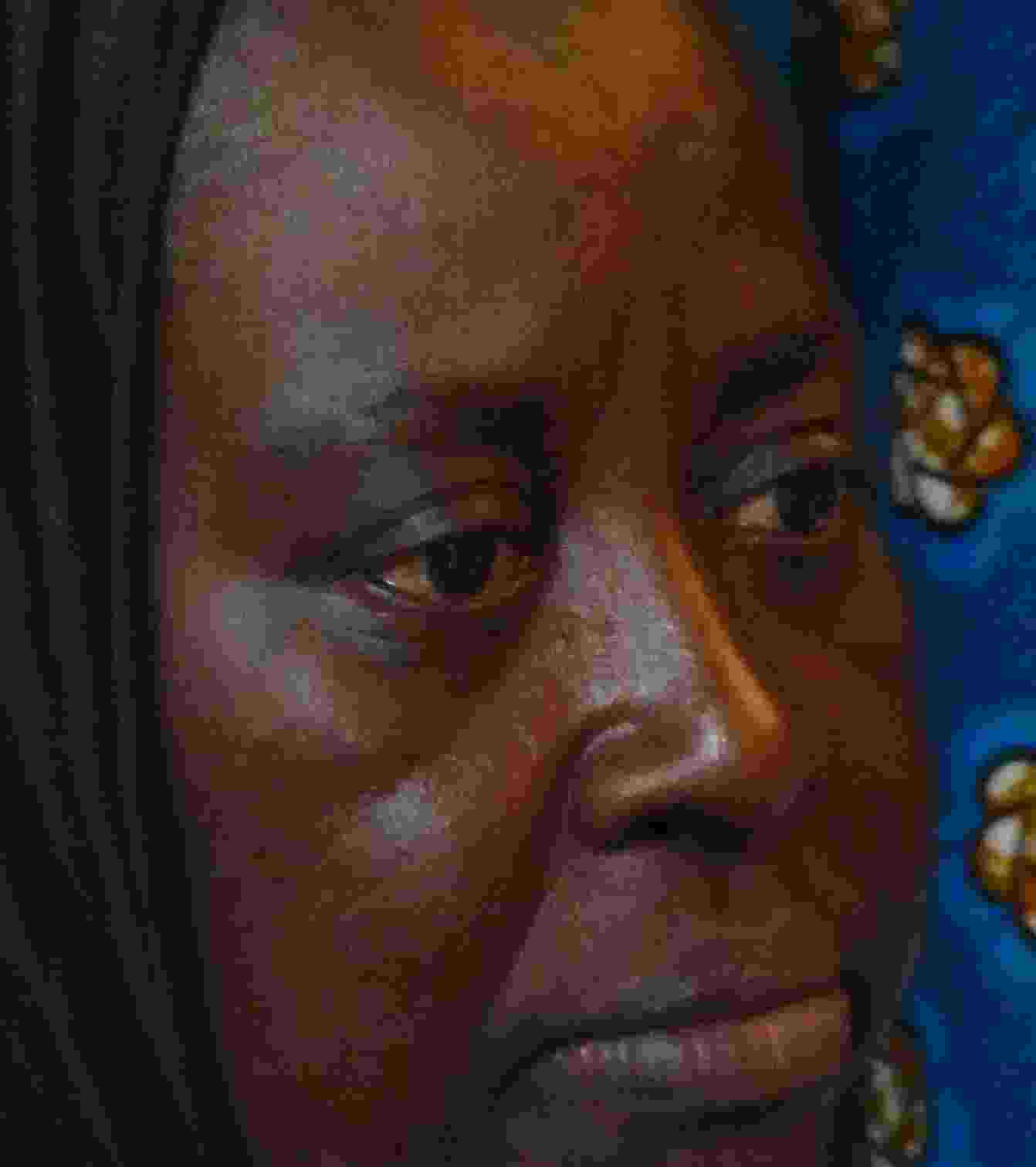  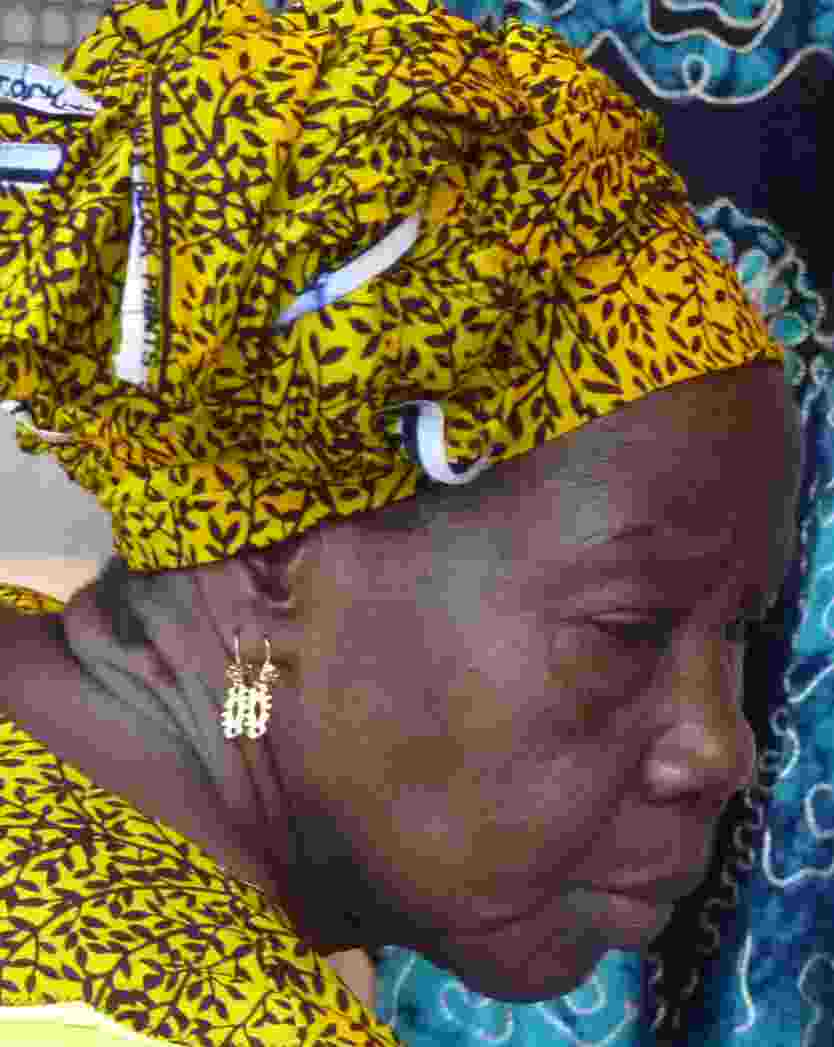 
2017 NUITS D'AFRIQUE MUSIC FESTIVAL
report: ROBERT
J. LEWIS
______________________________________________________
Music
was my refuge
I could crawl into the spaces between the notes
and curl my back to loneliness.
Maya Angelou
Despite
changes at the top – Colin Rigaud takes over some of the
programming responsibilities of Frédéric Kervadec
– the song (the template) remains the same, just as Montreal’s
Nuits
d’Afrique
music festival remains perhaps the biggest and best festival of
its kind in the world. For 12 days and nights, Africa puts on
a show that celebrates diversity through music and culture.
Never in the history
of the planet have there been so many migrations of people and
mixing of cultures. Music has especially profited from this
synergy and reminds us that when borders disappear, the energy
of creation is always there to fill the void. The manifest ease
in which unlike musics mix and marry often inspire the same
in people who refuse to see the world in terms of race and ethnicity.
Les Nuits d’Afrique is a lesson in progress on just how
much world music owes to Africa, and how open Africa is to the
huge catalogue of the world’s musics.
Like a burst of
radiant light in a starless solar system, the tone of the festival
takes its cue from the boundless energy and enthusiasm of its
inimitable master of ceremonies (MC) the ever effervescent,
incandescent welcoming and witty Willy B. Rose. As an astrophysical
phenomenon, Willy is the equivalent of the Big-Bang from which
the entire festival draws its energy and animation. He embodies
the dynamism and diversity that makes Montreal the world’s
foremost “yes we can” city of festivals.
Opening the 31st
edition of Nuits d’Afrique with a rousing two sets at
the legendary Club Balattou
was The Delgres Trio, featuring Pascal Danae on guitar
and vocals. No surprise that he’s played with the likes
of Peter Gabriel, Gilberto Gil and Youssou N‘Dour. He
combines the swampy Mississippi delta sound with the malaise
and ennui of post-modernism answered in full with some foot
stomping reggae. But it is his rich and resonant voice that
you can’t get enough of, as well as his keen understanding
that you can say more by playing less: all the solos, from guitar
to trumpet to drums (yes drums) were spare but inspiring, without
a trace particle of virtuosity. All the egos were in service
of the music, and “that’s the way I (and everyone)
like it.”
 What
I admired in Kae Sun in 2012 (@Balattou) and again this year’s
2017 edition of Les Nuits was that he’s not beholding
to the musical or cultural tyrannies of his Ghanese roots. He’s
his own person, his own appointment and pointman, a friendly
lightening rod for the angst, despair and joy that is the urban
sprawl of Toronto in 21st century. We look to artists like Kae
Sun to find ourselves, to help us articulate the challenge of
growing roots and finding that fugitive equipoise in a largely
indifferent world where tribal loyalties have been reduced to
one’s relationship with his iPhone, where the young generation
doesn’t even look up to see who’s walking by because
it is too busy texting. More than any act in this year’s
festival, Kae Sun allows his music to breathe; he understands
that the note we can’t miss is the silence between the
notes. Kae Sun is already good and he’s going to get better. What
I admired in Kae Sun in 2012 (@Balattou) and again this year’s
2017 edition of Les Nuits was that he’s not beholding
to the musical or cultural tyrannies of his Ghanese roots. He’s
his own person, his own appointment and pointman, a friendly
lightening rod for the angst, despair and joy that is the urban
sprawl of Toronto in 21st century. We look to artists like Kae
Sun to find ourselves, to help us articulate the challenge of
growing roots and finding that fugitive equipoise in a largely
indifferent world where tribal loyalties have been reduced to
one’s relationship with his iPhone, where the young generation
doesn’t even look up to see who’s walking by because
it is too busy texting. More than any act in this year’s
festival, Kae Sun allows his music to breathe; he understands
that the note we can’t miss is the silence between the
notes. Kae Sun is already good and he’s going to get better.
To a packed house
at the Metropolis, Amadou & Mariam delivered their patent
and very polished set of West Wing influenced rock that sets
itself apart with that now familiar and always ingratiating
high-pitched, generic African sounding vocalese that issues
from at the upper back of the throat. Audiences lapped it up
as the legends lived up to their reputation.
One
of the many great festival voices belonged to Jamaica’s
Jesse Royal who rocked the Fairmount with a crowd pleasing evening
of 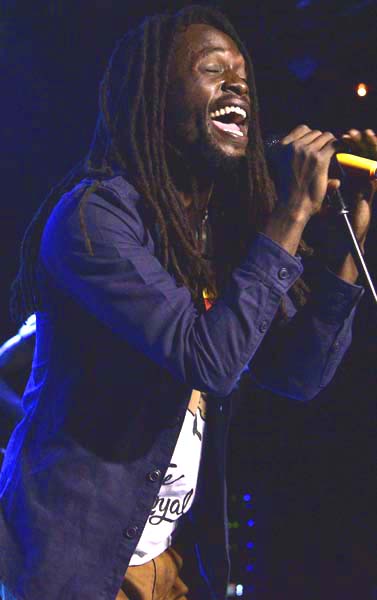 progressive
reggae. For some, if the brain doesn’t properly shut down,
reggae can become repetitive (code for narcoleptic, lobotomizing),
but Royal produced a wide range of rhythms and emotions, including
several tracks of nervous, almost rap-like reggae that were informed
by, with a nod to Mr. Marley, revolution rousing, anti-disestablishment
lyrics. To the A-major relief of the fat cats at the top, Canada’s
gun laws held sway. progressive
reggae. For some, if the brain doesn’t properly shut down,
reggae can become repetitive (code for narcoleptic, lobotomizing),
but Royal produced a wide range of rhythms and emotions, including
several tracks of nervous, almost rap-like reggae that were informed
by, with a nod to Mr. Marley, revolution rousing, anti-disestablishment
lyrics. To the A-major relief of the fat cats at the top, Canada’s
gun laws held sway.
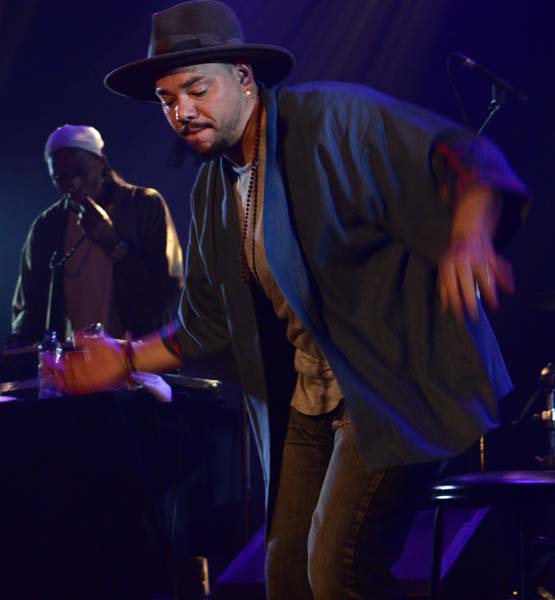 The
best male voice of the festival belonged to the incomparable
Ben l’Oncle Soul: he combines the smooth avocado richness
of Marley with the resonance of John Legend and delivered a
set of music that can only be described as off the wall. Playing
most of the tracks from his latest CD, Under My Skin
-- the ‘soulman’s favourite Frank Sinatra standards
– he methodically, and sometimes brilliantly, puts the
old material through the shredder, then picks up the pieces,
soaks them in rocket fuel and sends them and his adoring audience
into another orbit – except for the slow stuff such as
Jerome Kern’s “The Way You Look Tonight" and
the blissfully transcendental “It Was a Very Good Year.”
(Observing Stanley
Paen -- the city's voice of jazz --- from a 'safe'
distance, I could swear he was levitating during the concert).
Not since the Vanilla
Fudge (You Keep Me Hanging On) have we
heard such a reworking of standard material, taking base metal
and transmuting it into diamonds in the sky. Whether Ben l’Oncle
Soul’s arresting alchemies can stand up to repeated listening
remains to be heard. For blogger Ivan
Nonveiller's insightful review (in French) of
both the venue and the vedette (the star), click
here. The
best male voice of the festival belonged to the incomparable
Ben l’Oncle Soul: he combines the smooth avocado richness
of Marley with the resonance of John Legend and delivered a
set of music that can only be described as off the wall. Playing
most of the tracks from his latest CD, Under My Skin
-- the ‘soulman’s favourite Frank Sinatra standards
– he methodically, and sometimes brilliantly, puts the
old material through the shredder, then picks up the pieces,
soaks them in rocket fuel and sends them and his adoring audience
into another orbit – except for the slow stuff such as
Jerome Kern’s “The Way You Look Tonight" and
the blissfully transcendental “It Was a Very Good Year.”
(Observing Stanley
Paen -- the city's voice of jazz --- from a 'safe'
distance, I could swear he was levitating during the concert).
Not since the Vanilla
Fudge (You Keep Me Hanging On) have we
heard such a reworking of standard material, taking base metal
and transmuting it into diamonds in the sky. Whether Ben l’Oncle
Soul’s arresting alchemies can stand up to repeated listening
remains to be heard. For blogger Ivan
Nonveiller's insightful review (in French) of
both the venue and the vedette (the star), click
here.
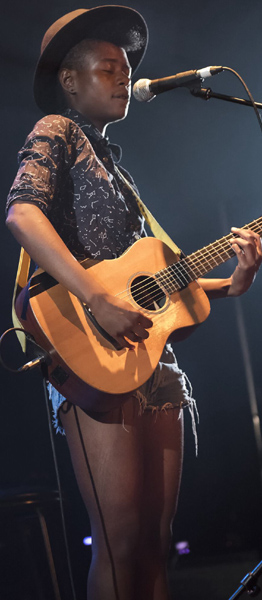 The
opening act introduced us to the ear-opening interpretations
and catchy songwriting of Tamara Weber-Fillion: her plaintive
voice is ideal for her mostly confessional material. Once she
learns to stay away from the high notes which she can’t
quite reach and dress up her compositions with additional hooks
and timely changes in tempo, she’ll be quickly compared
to the best. The
opening act introduced us to the ear-opening interpretations
and catchy songwriting of Tamara Weber-Fillion: her plaintive
voice is ideal for her mostly confessional material. Once she
learns to stay away from the high notes which she can’t
quite reach and dress up her compositions with additional hooks
and timely changes in tempo, she’ll be quickly compared
to the best.
Tunisia’s
post-modern Emel Mathlouthi, one of the voices and daughters
of the Arab Spring, created a very special ambience that kept
the faith with the tragic Arabic minor key. Her very powerful,
and Om K-clean and haunting voice was backed up by keyboards
and drums blow-dried out of a synthesizer to the effect that
the music sounded like it originated in a digitalized Mosque
orbiting around Jupitor, with the ‘chanteuse’ serving
as chief iMama. Her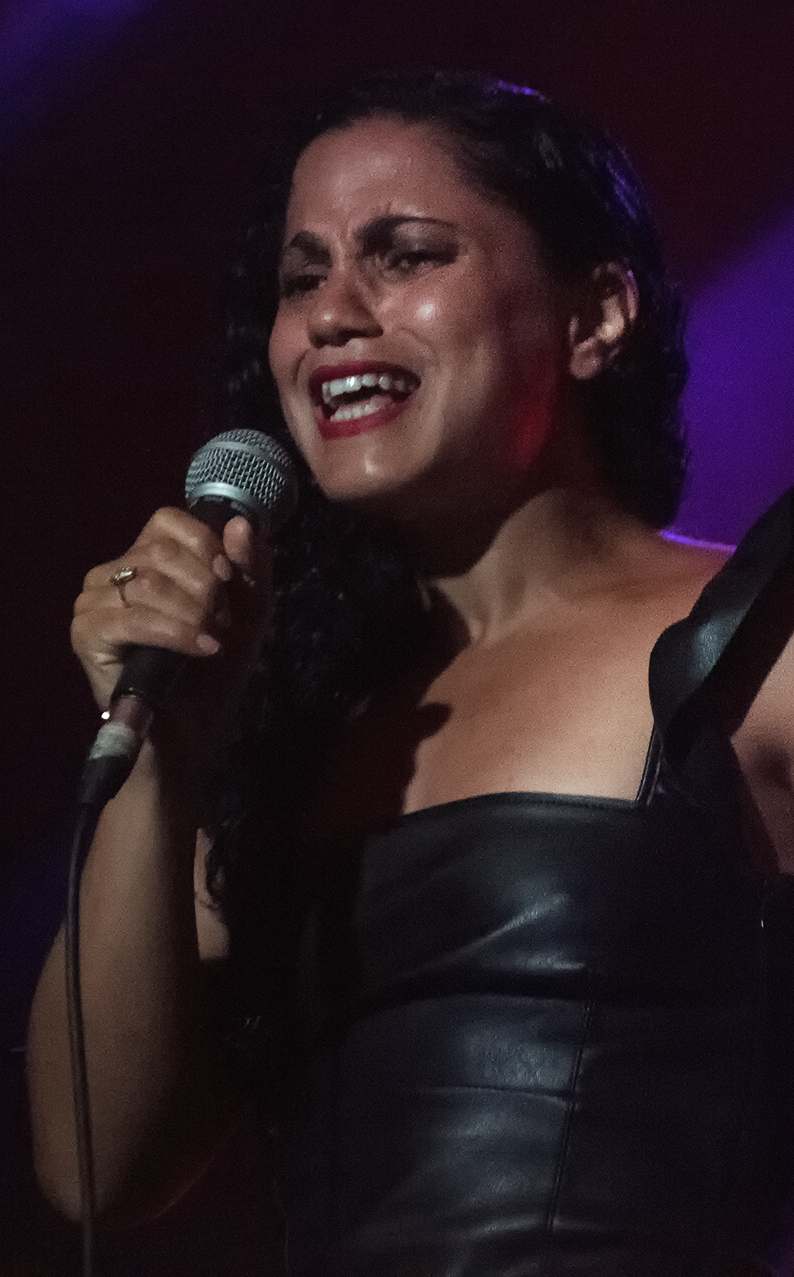 message was distinctly political, sympathetic to the plight
of the Syrians, and the thousands of nameless victims of the
aborted Arab Spring. Implicit in her relentlessly minor key
compositions is that Chapter II of that spring is simply a question
of turning the page, and that it's a personal source of pride
that she won't be invited to perform for the Saudi Prince in
the near future. Her heart rendering music is a reminder that
the beating heart that is Africa speaks to all people for whom
the cry of freedom is a universal cry.
message was distinctly political, sympathetic to the plight
of the Syrians, and the thousands of nameless victims of the
aborted Arab Spring. Implicit in her relentlessly minor key
compositions is that Chapter II of that spring is simply a question
of turning the page, and that it's a personal source of pride
that she won't be invited to perform for the Saudi Prince in
the near future. Her heart rendering music is a reminder that
the beating heart that is Africa speaks to all people for whom
the cry of freedom is a universal cry.
As usual, the festival
concludes with the free outdoor concerts at the Quartier de
Spectacle, in the heart of downtown Montreal. This year’s
edition of Les Nuits featured an unprecedented six days of activities
and festivities, with concerts beginning in the afternoon and
running well into the evening. Among the many musical highlights
were Zimbabwe’s Mokoomba, the kora-rock mix of Zal Sissokho,
who was the surprise special guest of Jean-Francois Leger for
his homage to the Bossa Nova; and Martinique’s pulchritudinous
Stella Gonis who introduced her set with the creative blowing
of the conches before her magnificent voice filled the sky with
love and light. For the young and curious, throughout the day
there were instructive mini-concerts, workshops and ateliers
on the origins and intricacies of the many African instruments
that were highlighted during the festival, as well as lessons
on dance, art and mask making.
Reducing Les Nuits
to its existentials, it is a trip and half and more to places
and spaces that would otherwise remain journeys never taken.
Those who came, left happier and wiser and better.
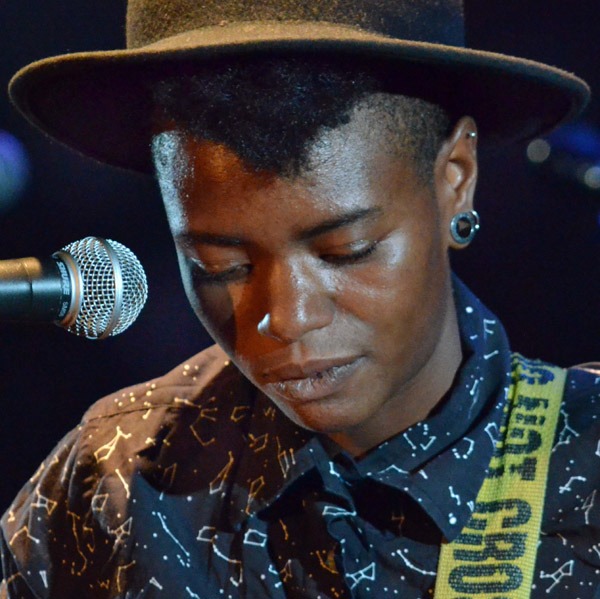
COMMENTS
J’aimerais
prendre le temps de vous remercier, au nom de toute l’équipe,
pour l’excellent reportage que vous avez écrit
dans Arts & Opinion. Votre style de rédaction
est vraiment agréable à lire et vos commentaires,
tous très élogieux, nous confirment que ce Festival
est nécessaire et vivifiant, que ce soit pour les artistes
qui y performent que pour le public et nous-mêmes qui
y travaillons.
Merci de faire rayonner le festival via votre plume et votre
média. Au plaisir de collaborer de nouveau avec vous.
Diane Ouellet
Communication et relations de presse
communications@festivalnuitsdafrique.com
|
|
|